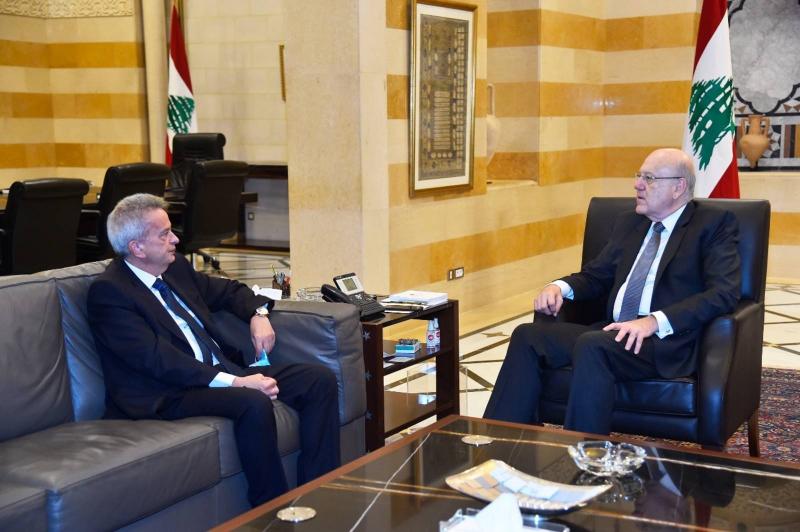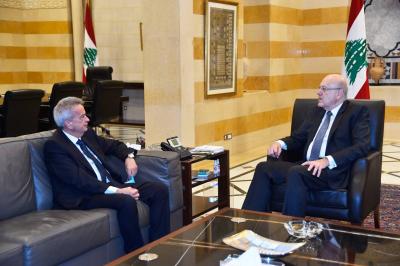The newspaper "Al-Akhbar" reported: Recent judicial developments in Europe against the Governor of the Central Bank of Lebanon, Riad Salameh, and his family have accelerated, coinciding with increasing French pressures on Prime Minister Najib Mikati and the Public Prosecutor, Judge Ghassan Oueidat, to respond to cooperation requests and allow the Lebanese investigation to proceed. These measures have prompted Mikati to hold meetings with potential candidates to succeed Salameh, at a time when political entities are discussing the end of the era of "governorship" as Lebanon has known it for three decades. Nevertheless, indicators from recent days, such as government consensus on capital control and the postponement of Salameh's questioning, along with the decision to release his brother on bail, suggest that the protective umbrella around Salameh has not been lifted after France, Germany, and Luxembourg agreed to freeze Lebanese assets worth €120 million as part of a money laundering investigation.
The freezing, related to an ongoing investigation into five suspects for embezzling more than $330 million and €5 million from the Lebanese state between 2002 and 2021, heavily impacts Salameh's protectors, led by Prime Minister Najib Mikati. It is no longer tenable to claim that Judge Ghada Aoun is "unstable" and pursuing political agendas to thwart any attempts to challenge the governor. At least five European countries (France, Germany, Switzerland, Belgium, and Monaco) are investigating Salameh's illicit wealth, alongside those identified in the investigation as being directly linked to him, including his brother Raja Salameh, assistant Marian Hawiik, and girlfriend Anna Kuzakova. The German investigations also speak of the involvement of his son Nadi Salameh and son-in-law Shafiq Abi Al-Lama.
These new measures, which have moved from suspicions and cooperation requests from Lebanese authorities to opening investigations and seizing properties and assets, have disrupted the political circle tightly surrounding Salameh. Mikati has complied—according to informed sources—after the noose tightened on him, first by Monaco requesting judicial assistance from the Lebanese Ministry of Justice regarding files relating to Mikati and his family, and second, through recent French warnings of sanctions if he continues to obstruct the investigations.
This led to his step back, as he no longer insists on protecting Salameh, as sources claim, and in the past few days, at French request, he has been meeting with potential candidates to take Salameh's place. Notably, the rejection by the French candidate Samir Asaf to accept this position has made him a key player in selecting another candidate. Meanwhile, negotiating parties on Salameh's succession are now discussing the end of the central bank governance era as the country has known for three decades, particularly with discussions on the necessity of amending the currency and credit law to enable administrative and legal restructuring of the Central Bank related to changing the governor's tasks.
This is detailed in advice presented by a delegation from the IMF, suggesting that the three presidents must separate the function of the Central Bank on one hand and the Higher Banking Authority and the Banking Control Commission on the other, with the governor and the central council representing executive management, while a wise council is appointed to supervise them, acting as a guardianship council to monitor the smooth operation. Consequently, the governor, or rather the "financial governor," would be responsible for determining monetary policy and providing financial advice to the state without having authority in any other tasks.
However, the optimism being conveyed by some political factions is contradicted by recent events, particularly the passage of the capital control project through governmental consensus in a cabinet session the day before yesterday, following fierce objections to it in the joint committees from the same political entities. This was followed by Salameh extending Circular 161, culminating in the recent decision by Judge Nicholas Mansour to release Raja Salameh and postpone questioning the governor until June, thus delaying judicial proceedings against him until after the parliamentary elections. These are clear signs that the conditions for his replacement have not yet matured, knowing that the government's move into caretaker mode will not serve the expected change.
The French threats communicated to Mikati were also conveyed to Public Prosecutor Judge Ghassan Oueidat. There are discussions of assigning one of the judges to file charges against Salameh in alignment with the European judicial investigation and cooperation requests that have not received Lebanese cooperation. Some indicate that one option for Oueidat could be appointing Judge Ali Ibrahim, not Judge Jan Tannous, who is in charge of investigations into Raja Salameh's case.
Simultaneously, information suggests the establishment of a European investigative unit acting as a "data center" tasked with gathering all information and responses regarding the positions of politicians, media, and judicial entities related to the investigations concerning Salameh, in preparation for actions against obstructers. "Al-Akhbar" has learned that a group of major Lebanese depositors in various European countries is preparing complaints against Lebanese politicians for their role in protecting public and private funds theft, particularly if the capital control is approved in its latest format, which includes nullifying internal and external judicial rulings to serve Salameh, his brother, and banks.
These depositors primarily base their claims on investigations conducted by French, German, and Belgian judicial authorities tasked with examining serious financial crimes, and their initiative to seize real estate assets and bank accounts related to the governor due to his involvement in embezzlement and money laundering offenses. Alongside the seizure of two properties in the sixteenth district of Paris (€16 million) and bank accounts in France (€2.2 million) and Monaco (€46 million) and Luxembourg (€11 million) and a building in Brussels (€7 million), German authorities confiscated a property in Hamburg and two properties in Munich. Additionally, shares in a real estate company in Düsseldorf, which the governor had purchased through the company "Dock 13 villa," previously registered under "Blue Rainbow 287 Vermögensverwaltung" in Munich, were frozen. German authorities have noted Salameh’s connection to the companies WBH 51 and H-Invest in Hamburg, while German media reported that these properties are temporarily chaired by Salameh's son, Nadi.
In Switzerland, the correspondence sent to Lebanon included findings from the investigations by the Swiss Federal Prosecutor's Office, confirming that the amounts embezzled since April 2002 to date have been fully or partially transferred to accounts in Switzerland before being laundered in various ways. Among these funds are transfers from one account to another with changes in the economic rights holder or investments in real estate in Switzerland and abroad, especially in the United Kingdom, or investments in financial bonds. Investigations suggest that washing operations have included large amounts and generated substantial returns for Riad and Raja Salameh and some of their family members and associates, including Marian Hawiik. Moreover, part of these profits, exceeding $200 million, was transferred in several installments from Switzerland to various bank accounts in five Lebanese banks belonging to Raja Salameh. It is noteworthy that Judge Jan Tannous was close to compelling these banks (Mideast Bank, Blom Bank, Lebanese Bank, Audih, and Saradar) to provide him with information about these transfers before he was halted by Judge Oueidat based on orders he received from the Prime Minister.




